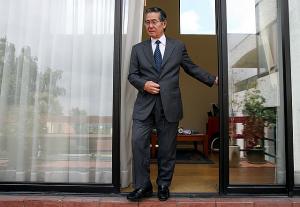
(above) Former Peruvian President Alberto Fujimori. © 2006 Reuters
Peru: Fujimori Ruling Expected Soon
Former Peruvian President’s Trial for Human Rights Abuses Is Coming to a Close
February 23, 2009 - Human Rights Watch
"The trial of Fujimori, a former head of state, has been a very positive development in international justice and accountability for human rights crimes. We hope that the Supreme Court panel that is trying him will reach a just decision that takes into account international standards on accountability for human rights crimes."
José Miguel Vivanco, Americas director at Human Rights Watch
The trial of former President Alberto Fujimori of Peru for human rights abuses has been conducted in a fair and thorough manner, Human Rights Watch said today. Human Rights Watch released an eight-page question-and-answer document concerning the case and applicable international standards.
"The trial of Fujimori, a former head of state, has been a very positive development in international justice and accountability for human rights crimes," said José Miguel Vivanco, Americas director at Human Rights Watch. "We hope that the Supreme Court panel that is trying him will reach a just decision that takes into account international standards on accountability for human rights crimes."
The questions and answers released by Human Rights Watch address international case law on establishing criminal liability, as well as issues relating to the evidence that prosecutors have presented to try to establish Fujimori's responsibility for two sets of killings, known as the Barrios Altos and La Cantuta massacres, in 1991 and 1992. The killings were carried out by a special Army intelligence unit known as the Colina unit.
Numerous pieces of evidence, including statements by Colina unit members and other members of the military, support the prosecutors' allegation that Fujimori knew of and authorized the operations of the unit and helped its members avoid real accountability through an Amnesty Law. Prosecutors also presented extensive evidence that Fujimori was deeply involved in the design, development, and implementation of counterterrorism strategy in Peru, and that the operations of the Colina unit were a part of that strategy.
After Fujimori evaded facing trial by spending several years in Japan and then going to Chile, Chile extradited him to Peru in 2007. Since then, he has been convicted on one set of charges involving an illegal search. His current trial, on human rights abuses, is coming to an end, and a ruling is expected in March. Fujimori still faces another set of charges involving multiple acts of corruption.